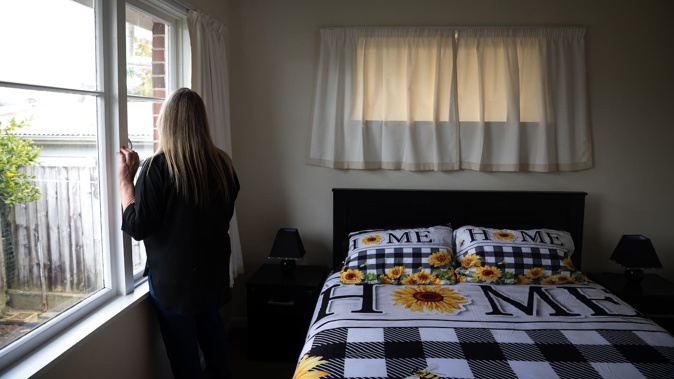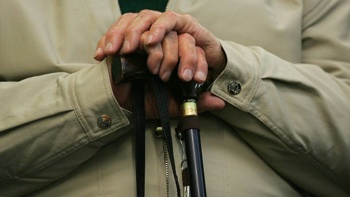
An Auckland woman is accusing Kāinga Ora of forcing her and her blind mother to leave their state home voluntarily – or face eviction and risk homelessness.
In April, Amanda was informed the house she’d lived in for 12 years would be put up for sale – and says that unless she signed a document falsely stating she “voluntarily relinquished” her tenancy, she would not be given options for transferring to another property.
Kāinga Ora is pushing ahead with the sale, despite Amanda’s desperate pleas for it to be cancelled or delayed, including three doctors’ letters stating it would pose a serious risk to the health of her and her 87-year-old mother.
With no sign of the housing agency letting up, Amanda, who didn’t want her last name published, is taking the case to the Tenancy Tribunal in the hope of intervention.
Amanda never thought she would end up in state housing before moving into one in a large South Auckland suburb 2013.
She said after 10 years of experience in tenancy management and owning her own company, two individuals defrauded her family trust, which held her entire life savings, a rental property and more.
Amanda claims the agency is acting illegally and is seeking justice. Photo / Sylvie Whinray
Her and her three young children were at risk of homelessness before being offered social housing by the state.
The children eventually moved out and Amanda’s elderly mother moved in with her in 2020 after needing care and being unable to live on her own.
Despite their difficulties, life was beginning to look up for Amanda last year, when she was given a $10,000 grant from the Ministry of Social Development (MSD) to start a new business.
“I was grateful ... it was a gruelling process,” she says.
“You’ve got to go through a really really strict vetting process because a $10,000 grant is coming from the likes of your taxpayer dollar, so they have to make sure everybody is worthy of the grant.”
“I was so excited last year, and all of a sudden April comes around.”
Amanda received a letter from Kāinga Ora which asked to schedule a meeting with her.
“It’s almost like giving someone an electric shock,” she says.
Her tenancy manager informed her the home was on a list of 900 being sold by Kāinga Ora under the Government’s new direction for the agency.
“It is bad enough being forced to just about be homeless once, but to [potentially] suffer it a second time? There are no words, really.”
Amanda accused Kāinga Ora of acting illegally. “It is coercion. It is threat.” Photo / Sylvie Whinray
She claimed that in the meeting, Kāinga Ora staff were cold and condescending.
“I was really upset, they wouldn’t answer our questions directly,” Amanda’s mother claimed to NZME.
Amanda provided doctors’ letters, seen by NZME, before the meeting, which explained the risks a transfer would have for them.
“Amanda is devastated,” one letter said. “Her mental health is at risk of a significant decline, the consequences of which I cannot determine definitively.”
“Equally, her mother is very at risk of a health decline. With her low vision and hearing issues, it is difficult for older people to navigate new spaces and hence she is at risk of harm, mainly due to falls, if she was moved to a new home.”
It also stated the importance of Amanda’s mother being close to her GP clinic and potential issues if the pair were to move.
In correspondence with Kāinga Ora, Amanda described how the sudden change was profoundly impacting her ability to start her business.
“This grant gave me hope for the future when I thought there was none ... this has caused my panic attacks to return with force and my depression as well. All when I am trying to get my new business off the ground after MSD extended such belief in me.”
She asked for them to delay the sale for just a year to give her a chance to make good use of the grant.
The staff in the meeting said they had received the letters but proceeded to give the pair an electronic document to sign, Amanda says.
Kāinga Ora tenant Amanda says it's been a great shock. Photo / Sylvie Whinray
In their state of distress and heightened emotion, the pair say they refused to sign it.
It was not until the next day Amanda discovered it was a “Business Initiated Transfer Document” that suggested they were voluntarily relinquishing their tenancy. If she didn’t sign it, she wouldn’t be offered a transfer to another property, she claims.
“What tenant gives up their own property and relies on their landlord to find them another property, without them even seeing it?” Amanda says. “Would you give up your own tenancy, not knowing where you’re going first? That is exactly what they’re asking.”
Because Amanda refused to sign it, Amanda says Kāinga Ora issued a 90-day notice, the clock started ticking and she says she was overcome with anxiety.
“So then you’re put in a situation where you either sign the transfer application in its current form or you’re homeless. They evict you and you’re gone. What kind of choice is that?” Amanda says.
“It’s bad enough for us,” Amanda’s mother says. “What about a solo mum with two or three kids that is terrified she’ll have the kids homeless? She signs it under duress because she knows that if she doesn’t, she won’t get another property. What sort of carry-on is this?”
In her submission to the Tenancy Tribunal, Amanda accused Kāinga Ora of acting illegally.
“It is coercion. It is threat.”
Amanda believed the home didn’t meet Kāinga Ora’s criteria to be sold and had received extensive work recently, including a bathroom renovation, new heating and an updated kitchen and hot water cylinder.
She said the housing agency should be giving tenants options for new places to live before making them sign a document or issuing 90-day notices.
Kāinga Ora responds
The housing agency said Amanda wasn’t the only tenant it had refused to transfer until they chose to voluntarily leave their state home.
Acting regional manager for Counties Manukau, Sonja Clearkin, said 227 tenants had gone through the same process in the past year.
“In all these cases, our placement teams have worked hard to ensure tenants are supported through the move and settle well into their new home.”
She said it was doing everything it could to support Amanda and her mum into another Kāinga Ora home that met their specific needs.
It said the proceeds from its sale of aged social housing would go towards new builds which were warmer, drier, the right size and in the right locations.
“In the case of the house Amanda is living in, it’s more than 70 years old and it needs a lot of money spent on it to bring it up to our standards,” she said. “We think the best course of action is to sell it and invest elsewhere.”
Kāinga Ora did not respond to questions on why it depended on tenants to relinquish their rental agreement voluntarily or why it was withholding transfer options until this was signed.
Jordan Dunn is a multimedia reporter based in Auckland with a focus on crime, social issues, policing and local issues. He joined Newstalk ZB in 2024 from Radio New Zealand, where he started as an intern out of the New Zealand Broadcasting School.
Take your Radio, Podcasts and Music with you









